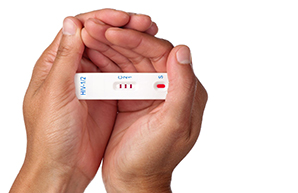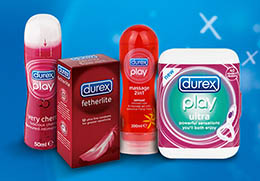Taking control of your own health just got a little easier. On 23 December 2016, the South African Pharmacy Council (SAPC) officially revoked a regulation that had previously prohibited South African pharmacies from selling HIV self-testing kits.
Up until then, local pharmacies weren't allowed to sell HIV self-testing kits – also known as HIV home test kits – although it was possible to buy them from online retailers. Not everyone has access to the Internet though, so the SACP’s decision will ensure accessibility to the tests for many more people, says Professor Linda-Gail Bekker of the Desmond Tutu HIV Centre at the University of Cape Town.
The benefits of HIV testing at home
“Pharmacies are by definition accessible and a lot of people are more likely to trust products sold in pharmacies such as Clicks [than from online retailers],” says Professor Bekker. “The SACP’s move will allow a large number of individuals who were previously very put off by attending a public sector site to now think about getting tested.”
People can now enjoy the privacy of being able to do the test independently, in their own time, and without the queues or the fear of loss of confidentiality that is inherent in attending a public testing site, she says. “The test can also be done with partners or friends, so people may be able to get their own support structures rather than relying on a stranger, albeit a trained healthcare worker."
The SACP has also published draft legislation that proposes that tests sold in pharmacies should be approved by the World Health Organization (WHO) or a suitable regulatory body, and that pharmacists should advise customers to get a second HIV test to confirm the first result if they tested positive.
Why the WHO recommends HIV self-testing
The Pharmacy Council’s decision followed guidelines published by the WHO in November last year recommending that HIV self-testing be offered in all countries to improve access to and uptake of HIV diagnosis.
The WHO reports that more than 18 million people with HIV are currently taking antiretroviral therapy (ART), but a similar number is still unable to access treatment, the majority of which are unaware of their HIV-positive status. Currently 40% of all people with HIV (over 14 million) remain unaware of their status. Many of these are people at higher risk of HIV infection who often find it difficult to access existing testing services, according to the WHO’s press statement.
"Millions of people with HIV are still missing out on life-saving treatment, which can also prevent HIV transmission to others," said Dr Margaret Chan, the WHO Director-General. "HIV self-testing should open the door for many more people to know their HIV status and find out how to get treatment and access prevention services."
According to the WHO, self-testing has been shown to nearly double the frequency of HIV testing among men who have sex with men, and recent studies in Kenya found that male partners of pregnant women had twice the uptake of HIV testing when offered self-testing compared with standard testing.
[Read more on the WHO HIV self-testing report]
But what about counselling when testing for HIV?
In the past, one of the biggest stumbling blocks when it came to the the proposed sale of self-test kits in South Africa was the historical insistence of the need for pre- and post-test counselling when testing for HIV – something that can't be enforced if people are testing at home. It was believed that if people didn't get counselling it could potentially increase their risk for unmanaged anxiety and the potential for suicide.
However, Professor Bekker says that a lot has changed over the past three decades: "Pre- and post-test counselling is largely from a time when we had very little to offer patients who tested positive. We were giving a life sentence and it was felt that people needed to be prepared for this possible outcome through counselling. There is still concern that with the need for life-long treatment people would still need to be prepared. However, we’re also trying to 'normalise' HIV as a chronic infectious disease. It is manageable, and is no longer a life sentence.”
It’s hoped that with this new awareness and universal access to immediate therapy, people will get themselves tested and either move to treatment immediately if positive, or actively engage in safer practices to stay HIV-negative, she adds. “As pre-exposure prophylaxis (PrEP) has become more available, we also want people to be able to test themselves easily to ensure they remain negative in order to be able to keep taking PrEP. As we know, PrEP is no longer indicated or safe in someone who has become HIV-positive."
What to keep in mind when using an HIV self-test kit
Most HIV self-test kits rely on a simple pin prick of blood, are easy to use, and can give you results in 15 minutes. The tests approved by the WHO are considered to be 99% accurate.
However, remember that it takes six to 12 weeks for your body to create antibodies to the HIV virus. As a HIV test is looking for the antibodies – and not the actual virus – it is possible to get a negative test result during this window period. For this reason, it's important to get tested regularly, and if you suspect that you might have possibly been exposed to the virus, to take another test after the 12-week period to confirm a negative diagnosis.
Also, it’s very important to know that HIV self-test kits are just screening tests and that the result of the test needs to be confirmed by a doctor or at a clinic by having a second test.
You can also call the National AIDS Helpline on 0800 012 322 for counselling and advice.
How Clicks Clinics can help you
Did you know Clicks offers HIV testing and counselling at their clinics? To make an appointment at a Clicks Clinic, call 0860 254 257 or book online at Clicks Clinics online.
HIV self-testing kits are also available for purchase in-store.
IMAGE CREDIT: 123rf.com
FEATURED PRODUCT: Durex condoms
Don't be caught unprepared: stock up on Durex condoms via the convenience of online shopping so that you can ensure you're practising safe sex at all times.


